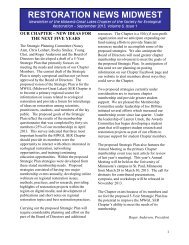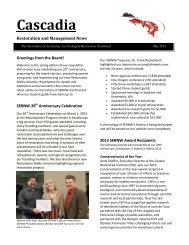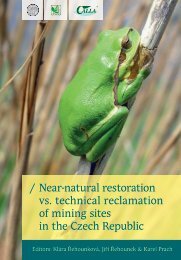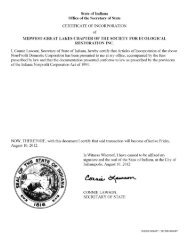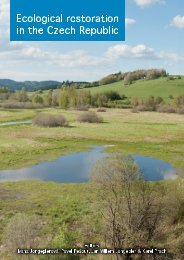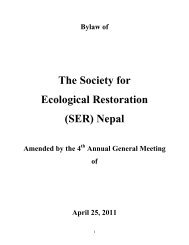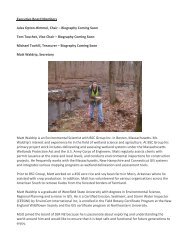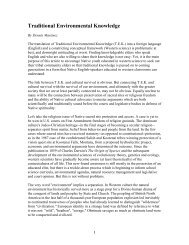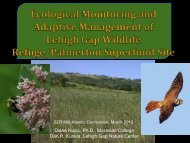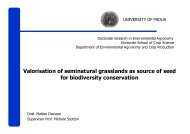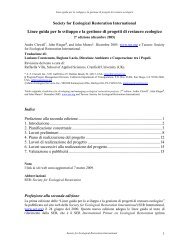THE WORLD CONFERENCE ON ECOLOGICAL RESTORATION
A Global Challenge - Society for Ecological Restoration
A Global Challenge - Society for Ecological Restoration
Create successful ePaper yourself
Turn your PDF publications into a flip-book with our unique Google optimized e-Paper software.
2005 The World Conference on Ecological Restoration 47<br />
dictable environment of the future, (2) dynamic nature of ecological communities with multiple trajectories,<br />
and (3) interconnections of landscape elements for ecosystem functions and structures. Long-term<br />
and explicit goals, monitoring, and evaluation criteria are also essential for sustainability of restored<br />
ecosystems. This paper will present a theoretical framework for applications to this new paradigm.<br />
Keywords: restoration ecology, sustainability, paradigm.<br />
The water pollution prevention behaviors in Bangkok<br />
R. Choiejit 1 , R. Teungfung 2<br />
1 Department of Economics, Faculty of Social Science, Srinakharinwirot University, Bangkok, Thailand.<br />
2 Department of Social Science, Faculty of General Education, Rajamangala University of Technology, Nonthaburi Campus.<br />
Thailand<br />
This paper intended to review and examine the participation behaviors in the water pollution prevention<br />
in Bangkok and its vicinity. The participation behavior concerning water pollution prevention among various<br />
stakeholders including personal and community levels were examined. The results showed that personal<br />
factors such as sex, age, level of education, occupation and other individual characteristics influenced<br />
the water pollution prevention for the residents of Bangkok and its vicinity who living nearby the<br />
Chao Phrya river and other major canals. Residents of Bangkok and its vicinity had very high levels of<br />
the knowledge, attitude and perception toward the water pollution problems due to the effective water<br />
quality concern campaigns distributed by the mass media, particularly the television and radio. However,<br />
the levels of the participation behaviors were low in action for both personal and community dimensions.<br />
This indicated that there was a quite difference between people’s thought and behavior in reality. Longer<br />
time spent on their own businesses, household tasks and less attention to the practice of local residents<br />
were main causes of low levels of personal participation behaviors on the water quality concerns. A lack<br />
of local community leadership and/or the ineffective existed local community leader coupled with the ineffective<br />
co-ordination and public relation among various agencies such as local community organization,<br />
government and non-government agencies were the main causes of the failure in practices regarding to<br />
the environment conservation under the basis of the sustainable development. To achieve the high levels<br />
of the participation behaviors in the water pollution prevention under the basis of the sustainable development,<br />
this paper suggests that local community leadership development and community organization<br />
development programs should be emphasized. Revising of laws and official regulations were done also to<br />
support the local community to cope with the environmental problems effectively and systematically.<br />
Keywords: Water pollution prevention behavior in Bangkok.<br />
Conservation of dolphins – a tool for sustainable development and management<br />
of protected wetland in bihar: a case study in vikramshila sanctuary<br />
Choudhary S.K., S. Dey and S. Dey<br />
VBREC, University Deptt. Of Botany, T.M.Bhagalpur University, Bhagalpur-812007<br />
Conventional wisdom suggests that people living in one of the poorest and politically unstable regions of<br />
the Asian subcontinent should be more concerned with economic security than with conserving wildlife.<br />
But in the Vikramshila Gangetic Dolphin Sanctuary (VGDS) of Bihar, India, a local group of conservationists<br />
from Bhagalpur University together with the Whale & Dolphin Conservation Society, U.K. in association<br />
with local community has initiated a project to turn a 60km segment of middle Ganges from a<br />
Sanctuary that till recently existed only on paper into one that provides meaningful protection for river<br />
dolphins and other aquatic fauna. It has also helped in the restoration of the ecology of river Ganges and<br />
its fisheries, leading ultimately to sustainable development and management of the Sanctuary. The Sanctuary<br />
was designated in 1991 and is the only protected wetland in Asia established specifically for<br />
Ganges river dolphins or ‘Soans’ Platanista gangetica gangetica. Vikramshila sanctuary has a rich biodiversity.<br />
In addition of Ganges river dolphins, our survey team has recorded gharial crocodilians Gavialis<br />
gangeticus, Smooth coated otters Lutragale perspillata, a variety of hard shell turtles, 76 numbers of fish<br />
species, 2 species of crustaceans and 135 species of birds. Bird species include 32 species of migrants<br />
including Greater Adjutant Storks Leptoptilos dubius, species that had never before been recorded in the<br />
Ganga Basin. In May 2002, we found nesting sites of Small Indian Pratincoles (Glareola lacteal), Indian<br />
Skimmers (Rhynchops albicollis), Indian River terns (Sterna rantia), little terns (Sterna albifrons) and river<br />
lapwings (Vanellus indicus), on a sandy mid-channel island near Bhagalpur. We also documented rich angiospermic<br />
vegetation along the river bank and in the flood plains, including 36 species of dicots and 15<br />
species of monocots. Thousands of fishermen and farmers families live adjacent to the river and depend<br />
on the river-resources for their livelihood. The biodiversity in the Vikramshila Sanctuary is threatened<br />
today. The aquatic wildlife including dolphins are particularly vulnerable to the human activities because



